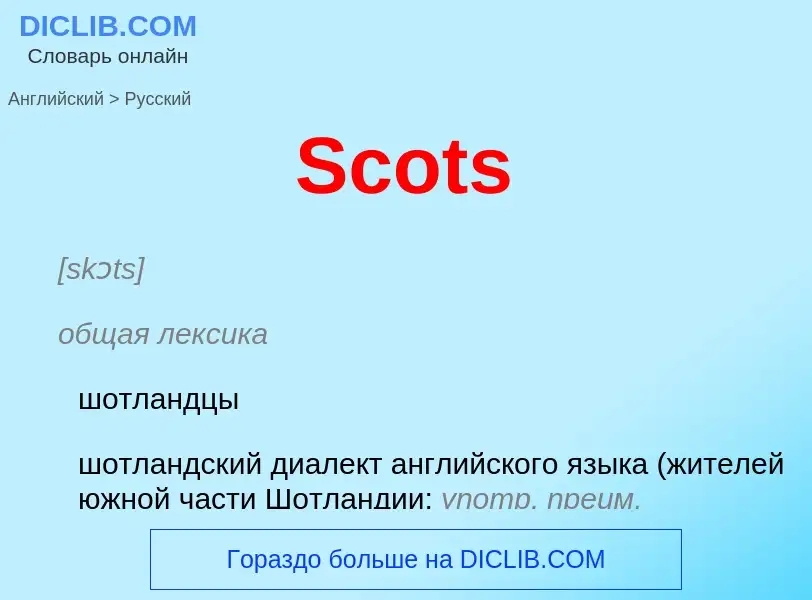Traducción y análisis de palabras por inteligencia artificial ChatGPT
En esta página puede obtener un análisis detallado de una palabra o frase, producido utilizando la mejor tecnología de inteligencia artificial hasta la fecha:
- cómo se usa la palabra
- frecuencia de uso
- se utiliza con más frecuencia en el habla oral o escrita
- opciones de traducción
- ejemplos de uso (varias frases con traducción)
- etimología
Scots - traducción al Inglés
[skɔts]
общая лексика
шотландцы
шотландский диалект английского языка (жителей южной части Шотландии; употр. преим. шотландцами)
диалект жителей северной Англии
история
скотты (кельтское племя [Celts], переселившееся в 6 в. из Ирландии на территорию нынешней Шотландии)
синоним
прилагательное
общая лексика
шотландский
существительное
[skɔts]
общая лексика
(the Scots) [собир.] шотландцы
шотландский диалект
история
скотты
[skɔt]
общая лексика
шотландец (употр. нешотландцами)
синоним
существительное
[skɔt]
общая лексика
шотландец
история
скотт
синоним
Definición
Wikipedia

Scots (endonym: Scots; Scottish Gaelic: Albais, Beurla Ghallta) is an Anglic language variety in the West Germanic language family, spoken in Scotland and parts of Ulster in the north of Ireland (where the local dialect is known as Ulster Scots). Most commonly spoken in the Scottish Lowlands, Northern Isles and northern Ulster, it is sometimes called Lowland Scots to distinguish it from Scottish Gaelic, the Goidelic Celtic language that was historically restricted to most of the Scottish Highlands, the Hebrides and Galloway after the sixteenth century, or Broad Scots to distinguish it from Scottish Standard English. Modern Scots is a sister language of Modern English, as the two diverged independently from the same source: Early Middle English (1150–1300).
Scots is recognised as an indigenous language of Scotland by the Scottish government, a regional or minority language of Europe, as well as a vulnerable language by UNESCO. In the 2011 Scottish Census, over 1.5 million people in Scotland reported being able to speak Scots.
As there are no universally accepted criteria for distinguishing a language from a dialect, scholars and other interested parties often disagree about the linguistic, historical and social status of Scots, particularly its relationship to English. Although a number of paradigms for distinguishing between languages and dialects exist, they often render contradictory results. Broad Scots is at one end of a bipolar linguistic continuum, with Scottish Standard English at the other. Scots is sometimes regarded as a variety of English, though it has its own distinct dialects;: 894 other scholars treat Scots as a distinct Germanic language, in the way that Norwegian is closely linked to but distinct from Danish.: 894


![Statue of [[Robert Burns]] in [[Canberra, Australia]] Statue of [[Robert Burns]] in [[Canberra, Australia]]](https://commons.wikimedia.org/wiki/Special:FilePath/AU Burns Canberra.jpg?width=200)
![Modern Scots]] by the mid 20th century}} Modern Scots]] by the mid 20th century}}](https://commons.wikimedia.org/wiki/Special:FilePath/History of Scots in Scotland and Ulster.png?width=200)
![Lufe God abufe al and yi nychtbour as yi self}} ("Love God above all and thy neighbour as thyself"), an example of [[Early Scots]], on [[John Knox House]], Edinburgh Lufe God abufe al and yi nychtbour as yi self}} ("Love God above all and thy neighbour as thyself"), an example of [[Early Scots]], on [[John Knox House]], Edinburgh](https://commons.wikimedia.org/wiki/Special:FilePath/John Knox House - Edinburgh Fringe.jpg?width=200)

![Scottish-born American industrialist and philanthropist [[Andrew Carnegie]] Scottish-born American industrialist and philanthropist [[Andrew Carnegie]]](https://commons.wikimedia.org/wiki/Special:FilePath/Andrew Carnegie, three-quarter length portrait, seated, facing slightly left, 1913.jpg?width=200)
![The province of [[Nova Scotia]] where over 30% of the population are of Scottish origin. The province of [[Nova Scotia]] where over 30% of the population are of Scottish origin.](https://commons.wikimedia.org/wiki/Special:FilePath/Bagpipes (7185891778).jpg?width=200)
![The [[Covenanters]] were members of a 17th-century Scottish religious and political movement The [[Covenanters]] were members of a 17th-century Scottish religious and political movement](https://commons.wikimedia.org/wiki/Special:FilePath/Covenanters in a Glen.jpg?width=200)
![[[James Naismith]], the inventor of [[Basketball]]. [[James Naismith]], the inventor of [[Basketball]].](https://commons.wikimedia.org/wiki/Special:FilePath/Dr. James Naismith.jpg?width=200)
![[[Patrick Gordon]] was a Russian General originally from Scotland and a friend of [[Peter the Great]]. [[Patrick Gordon]] was a Russian General originally from Scotland and a friend of [[Peter the Great]].](https://commons.wikimedia.org/wiki/Special:FilePath/FotoGordon.jpg?width=200)
![[[Guy Scott]], the 12th vice-president and acting president of [[Zambia]] from Oct 2014 – Jan 2015, is of Scottish descent. [[Guy Scott]], the 12th vice-president and acting president of [[Zambia]] from Oct 2014 – Jan 2015, is of Scottish descent.](https://commons.wikimedia.org/wiki/Special:FilePath/Guy Scott.png?width=200)
![South African]] [[Scottish regiment]] in France, 1918 South African]] [[Scottish regiment]] in France, 1918](https://commons.wikimedia.org/wiki/Special:FilePath/The German Spring Offensive, March-july 1918 Q8594.jpg?width=200)
![The Australian city of [[Brisbane]] is named after Scotsman [[Thomas Brisbane]]. The Australian city of [[Brisbane]] is named after Scotsman [[Thomas Brisbane]].](https://commons.wikimedia.org/wiki/Special:FilePath/Thomasbrisbane.jpg?width=200)
![Scottish Highland family migrating to [[New Zealand]] in 1844 Scottish Highland family migrating to [[New Zealand]] in 1844](https://commons.wikimedia.org/wiki/Special:FilePath/William Allsworth - The emigrants - Google Art Project.jpg?width=200)
